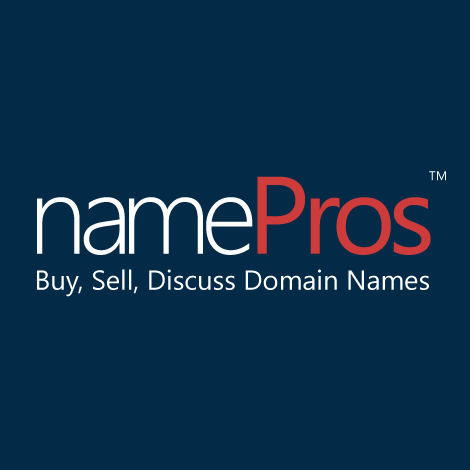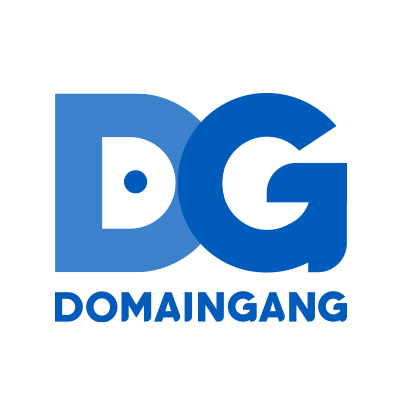YOUR AD HERE
A domain hack uses both sides of the dot to create a single word, for example pi.pe or ma.de. While some define domain hack more broadly, a definition that includes two related words, one on each side of the dot, we will use the narrower definition of a word split by the dot in this article.
Note that the term hack has a number of definitions. The one relevant to domain hacks is “a usually creatively improvised solution.” Some find the term domain hack unfortunate, as many people associate hack with an illegal access. Within the technology community, hacking takes on a positive tone. For example, the address of Facebook headquarters is 1 Hacker Way, Menlo Park, CA, USA.
The NamePros Blog considered domain hacks a few hears ago, Ten of the Best Domain Hacks in Active Use, but a lot has happened since then.
NamePros member @DomainGaze.com has been very active in promoting domain hacks, and sharing domain hacks in use. I reached out to him for this article, and the examples in the next section come from his compilation.
Who Uses Domain Hacks?
On his Twitter account, DomainGaze has been sharing domain hacks in use. Drawn from those posts, and replies from others, here are examples of some of the diverse ways domain hacks are in use.
- If your name is Adam, you could request to be added to this site ad.am.
- We usually think of hacks as a word, but you can use hacks to form acronyms too. For example, BMW use b.mw, although it is redirected to their .com.
- The circle is a powerful symbol for unity and connections, and Circles, a service that facilitates professional connections, uses circl.es.
- Interest in accessory dwelling units (ADUs) continues to grow. One key player in the sector is Cottage. They operate on cotta.ge.
- Brian Gaffney is Head of Engineering at Persuit. He specializes in creating apps with great user interfaces, and uses a pretty great domain hack for a coder: deb.ug.
- Dolphin Technologies, an insurance technology company, operate from Dolph.in.
- Espresso claim to make the world’s thinnest portable monitors. Their domain name is espres.so.
- I wondered if the famous electronic measurement company by the same name would be using it, but Flu.ke is in use by a Brazilian company.
- Fru.it could be a great name in other sectors, but it is used by a fashion footwear company.
- The Canadian company Framework do Chromebook customizations. They use the domain name frame.work.
- Gyroscope also use the .app, but gyrosco.pe is a natural hack.
- Hy.pe is used by the Web3 company Hype.
- The great hack ju.st could be used in many ways, but is the site for by a plant-based egg alternative.
- The innovative learning platform Lemma operate on lem.ma.
- Fashion, music, culture: that is the business of the company Made. They operate on ma.de.
- They redirect it to their .jp site, but Me.nu is a great domain hack in active use.
- The consumer analytics and insights company Milieu operate on the domain hack milli.eu.
- Although they redirect it to their .nl, noi.se is a pretty great domain for the branding company Noise.
- Into horror movies? Nope? Then maybe don’t check the trailer operating on the domain hack no.pe.
- Pes.to is a great domain hack that redirects to the Pesto app, a “digitally native, authentically human, workplace.”
- Pipe helps secure devices on the Internet of Things. They use a domain hack pi.pe.
- The Research Institutes of Sweden, RISE, use ri.se. The name works both from their name and as a metaphor for the positive impact of research.
- It may not be intentional, but the Lithuanian architecture and construction magazine uses a pretty great domain hack name sa.lt.
- Starfish is a great name for a web design company, and they use starfi.sh.
- Thi.ng is used by a collaboration for open source computing building blocks.
- Many companies could use the hack for the word transparent, but the domain hack transpa.rent is used by a company that builds speakers in transparent enclosures.
- Modern Tribe has an impressive client list for their digital creations, and the company operates on the domain hack tri.be.
- The powerful name univer.se is used by a company that empowers creation of websites directly from a phone. They have more than 40,000 users, and have raised more than $30 million in series B funding. Their marketing makes central use of their innovative domain name hack.
- VI.BE is an agency that interfaces between artists and music companies, and operates on Vi.be.
- If you eat sushi, you have probably had wasabi, the spicy green paste. A Canadian animation company thought that would be a great name for their company, Wasabi Entertainment. They operate on the domain name hack wasa.bi.
While a number of companies, at least during a transitional period, use the domain hack for redirection, increasingly we are seeing businesses using them as their main site. As @DomainGaze.com commented:
Brands with a tech-savvy audience can rely on these names, and even spin their entire promotions around their memorable names. They, in my view, are the flag-bearers that show domain hacks are gaining wider acceptance.
The shortest possible domain names possible are 1+2 letters long. One of those is p.ie. I don’t know who owns it for sure, but interestingly the domain name redirects to the Twitter homepage.
Our previous article and additions suggested by readers mentioned some great hacks involving big companies, such as:
In most cases they redirect to the main .com site.
Interview With Domain Hack Specialist DomainGaze
How long have you been in domain investing?
Less than two years. I bought my first domain back in 2002 when I didn't even have the means to buy a name! I asked my brother to secure a domain for me! I've really only bought domains for reselling since 2020. I still have my original name from 2002!
Have domain hacks been a major interest right from the start? What fraction of your portfolio is domain hacks?
Previously, I've been curious about domain hacks as they always struck me as creative when I saw companies using them. The urge to acquire them was sparked with a search suggestion by a registrar while searching for a keyword, sometime in late 2020. I was hooked as this reminded me of all the cool names I had seen earlier, but had never tried to acquire. Over 90 percent of my portfolio is comprised of domain hacks.
Why do you like domain hacks?
Primarily for their aesthetic beauty. Domain hacks are minimalist as they allow you to write a word or phrase across extensions without a single additional letter. They are extension-neutral and provide an artistic side to otherwise one-dimensional naming conventions. They are like collectible art!
Good domain hacks are a rare commodity. The availability of a keyword as a domain hack is very limited and doesn't multiply with the number of extensions. For instance, there is only one p.ie and no matter how many pie.extensions are registered, this remains the shortest and purest form!
From the point of view of the end user, what is the appeal of domain hacks?
On the commercial side, domain hacks spell creativity. These names are incredible at capturing attention in a world where attention spans are shrinking all the time. This makes them immensely potent for marketing.
Would you like to share some of the favourite domain hacks currently in your portfolio?
For me, domain hacks have an appeal greater their commercial value. It depends on the word, it also depends on whether you get a keyword+modified word. The short ones are always sweet, for instance, li.ke, f.ar, gy.ro and n.et. Others include progr.am, each.day, virtuo.so, and recur.rent.
Do you think corporate interest and acceptance of domain hacks is increasing?
Certainly so! However, do not take my word for it! I'd suggest people do their own research while aiming to keep their confirmation biases at a minimum. In the last couple of seasons for "Who uses domain hacks?", we've highlighted companies which use these as their primary name. And these are just a few instances we found.
People now understand what these are, and businesses recognize that as well. They also realize these names stand out and provide an inherent advantage in a crowded namespace. A growing list of companies are using them to good effect.
What are your favourite extensions for domain hacks?
I am extension-agnostic in his context. When it comes to creating artistic names, any extension which is open, affordable, stable and provides beautiful opportunities, is appealing to me. Be it ccTLDs, new gTLDs or even gTLDs.
Do you have any tips or advice for those considering getting into domain name hacks?
For me, this was more of a treasure hunt, a hobby which led me to find more such names. I would suggest newcomers to concentrate on a domain's commercial value and whether some ideas can be spun across it before jumping on to register any words that are available. Trying for shorter names, a smaller portfolio and investing in quality words is crucial.
What are your thoughts on the term ‘domain hack’. If you could change it to something else, what term would you propose?
If we could go back in time and have a better name, surely we can think of something that may be universally appealing. However, after these many years into it, I feel it is time to own the phrase. The word 'hack' is used in a positive connotation here for something ‘clever’ and so there is nothing wrong with it when people understand this.I believe these names are inherently creative and hence the name. I feel the solution does not lie in renaming, but in making people aware.
You can catch @DomainGaze.com here on NamePros, or his Twitter handle is DomainGaze. His Twitter feed and website, Gaze.Domains, provide additional examples of domain hacks in use.
A Brief History of Domain Name Hacks
The ICANN Wiki has a good history of domain hacks. It is widely agreed that the first domain hack registered was inter.net, registered on Nov 23, 1992.
That said, the earliest domain hack can be traced even further back. The domain name NORDU.net was registered Jan 1, 1985, prior to the first .com, Symbolics.com, registered March 15, 1985. NORDUnet is still in operation on the domain name. The name enea.se can also be considered a hack, and is even older, with a Whois creation date of April 7, 1983.
The term domain hack came later, attributed to Matthew Doucette who gave this definition on November 3, 2004:
An unconventional domain name that uses parts other than the SLD (second level domain) or third level domain to create the title of the domain name.
The ICANN Wiki article makes the case for domain hacks this way:
By including the entire domain namespace when searching for domains, many possibilities exist for new domain hacks going forward.
It is possible to use more than two levels to achieve a domain hack. For example, cr.yp.to uses three. The site provides links for key crypto and cryptography papers and resources.
The Wikipedia article on domain hacks largely draws on what is in the ICANN Wiki on the topic.
Domain Hack Sales
You can readily use NameBio to search for sales of domain name hacks. Select Niche under the Category field, then Domain Hacks from Subcategory.
At time of writing, there were 739 domain hack sales listed on NameBio, totalling $3.2 million, with an average selling price of $4288. See the full list here.
The top listed sale was s.top at $161,684 in 2017. That name did not resolve to a site the day I checked.
The name b.et, sold for $100,000 in 2021, and is in use by an online betting and trading platform,
An interesting top sale was c.at, which goes to a site that proclaims it is a “social network for cats and cat lovers.” The name sold in 2016 for $60,467.
A number of recent major sales are being well used. Some examples are:
- J.et, used by the Jetpack plugin.
- Pock.et, used by Pocket Casts, a podcasting app.
- Samur.ai is used by a service that provides guidance on cancelling subscriptions and services.
The bike sharing company Lime, who self-describe as “the world’s largest shared electric vehicle company”, upgraded a few years ago from their LimeBike.com to the domain hack Li.me.
The NamePros Domain Hack Discussion
Back in 2007, @xman started a discussion thread on Value of Domain Hacks. That discussion now stretches for 164 pages, with lots of great examples.
The 2019 NamePros Blog article on Ten of the Best Domain Hacks in Active Use highlights the major sales and hacks in use up to that time, along with discussion on the term ‘domain hacks’.
Please add in the discussion below great domain name hacks in use that were not mentioned in this article. Since the set of word1.word2 broader hacks is huge, let’s confine this discussion to hacks where a single word is split by the dot.
Feel free to express your opinion on the term ‘domain hack’ as well.
While only a tiny fraction of domain names sold or in use employ domain hacks, there are many examples of creatively using a hack to achieve a very short and memorable domain name.
Sincere thanks to @DomainGaze.com for sharing insights on domain hacks with NamePros readers, and collating the collection of domain hacks featured in this article. Also thanks to NameBio for making it so easy to search for listed domain name hack sales. Shout out to @xman who got the NamePros domain hack discussion going back in 2007, and @DomainHacks who has a great domain hacks portfolio and has done a number of the major sales.
 1 year ago
28
1 year ago
28






 English (US) ·
English (US) ·